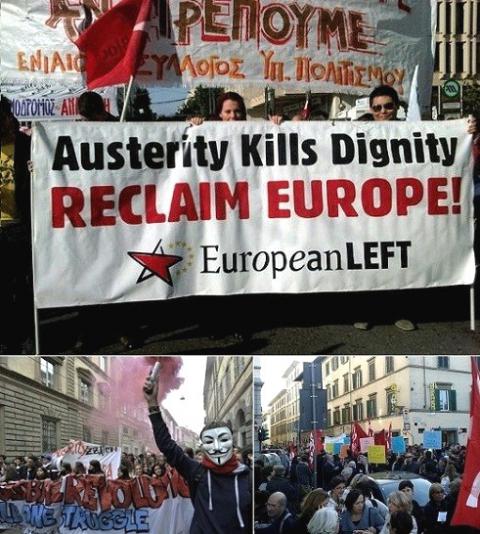Nick Dearden of Global Justice Now argued recently in these pages that the debt deal forced on the Greek government “is the brainchild of neoliberal fanatics with no respect for democracy.”
I would go even further — it isn’t simply that the elite that now controls Europe, along with most of the rest of the world, has no respect for democracy.
Having discovered they can no longer control it, they want to rob it of all meaning, destroying its substance while preserving its outer shell.
The capitalist experiment with democracy which began some 250 years ago has run its course.
At that time, by restricting the franchise and developing media and an education system which convinced enough people that capitalism simply reflected “human nature,” the elite were able to erect a limited democracy as a barrier against change.
This may not have been what the Peterloo Martyrs had in mind, but it suited the needs of the ruling elite perfectly.
They divided themselves into competing parties, often reflecting real material divisions between economic sectors along with religious and other social and cultural differences.
When social democracy came along they were fairly quickly able to remove any anti-capitalist milk teeth it may have grown and render that impotent too, although progressive forces made the social democratic parties themselves fields upon which the class war was fought out.
Now, however, the absolute imperative that is the European project means that the elite can no longer tolerate the element of chance which accompanies elections.
The EU is essential to shoring up and maintaining the rate of profit.
It was a precipitous fall in the rate of profit which in the 1970s kicked off the whole neoliberal counter-revolution, a creative-destructive process which is now reaching its apotheosis.
Now, the situation is even more dangerous and the people cannot be allowed to stand in the way of more intense Europeanisation and the boost to profits which — or so it is hoped — this will represent.
Greece is an obvious example of this. It is the kind of event which every news outlet is covering in one form or another.
Less spectacular moves to undermine democracy tend to receive less coverage.
Since the first stirrings of democratisation, parliaments have been one of many terrains of struggle, and parliamentary politics is one genuine, if highly problematic, means to further the cause of human emancipation. They can no longer be allowed to fulfil this role.
On the one hand, anti-capitalist politics is gaining at the ballot box. On the other, the far-right is on the rise and nationalistic ideas widespread.
The unpredictability of electorates in recent years means that no-one can guess what the future may bring. A bulwark must be built against the resistance.
This bulwark is made up in part of that section of the population who are doing all right and whose main fear is that ill-defined demon “instability.”
It’s made up in part of police forces equipped like Star Wars stormtroopers, and under ever weaker restraint.
And it’s made up in part of parliaments and other elected institutions which retain only the outward forms of democracy, their alleged function of representing the people weakened to the point where it has become pure deception.
In common with the European Parliament, national parliaments are no longer true terrains of struggle, or at best they’re in the process of losing the powers which make them worth fighting over.
The recently published Roadmap for the Future of the Economic and Monetary Union is less sensationally newsworthy than is what’s going on in Athens but, if anything, it is even more menacing to democracy.
Signed by five “presidents” — of the European Council, the European Commission, the European Parliament, the European Central Bank and the Eurogroup — it doesn’t contain much that’s strikingly new, but what it does do is systematise and confirm the abolition of national democracy.
It gives the EU institutions the power to demand “reforms” from the member states which, as many analysts have pointed out, go beyond what the US federal government can demand from one of the United States.
This began with control of what was defined as “overspending” — in other words, with austerity.
But it now goes much further, to enable the EU to insist on changes to the organisation of the labour market and even to wage levels.
The council, it’s true, does represent the member state governments, but under the system known as “European economic governance,” it is answerable to no-one, neither national parliaments nor a European Parliament which has the “power” only to discuss its decisions in the all-important area of economic policy.
The report says that national parliaments for their part have to be “consulted” more systematically before the annual “national reform and stability programmes” are submitted.
Add to this the new round of trade deals — of which the principal example is the Transatlantic Trade and Investment Partnership (TTIP) — which threaten to lower standards across a range of policy areas including labour law, consumer law and environmental protection, and you can already see that any popular influence is being consigned to an ever-narrower policy range.
Greece can only be understood as part of a much broader assault by a ruling elite which wants to see effective democracy consigned to the museum of 20th-century historical curiosities.
It is a fight in which all of the gains of two centuries are under threat, and way beyond the shores of the Hellenic peninsula.
- Steve McGiffen is editor of www.spectrezine.com, which has been haunting Europe since 1997.


Spread the word